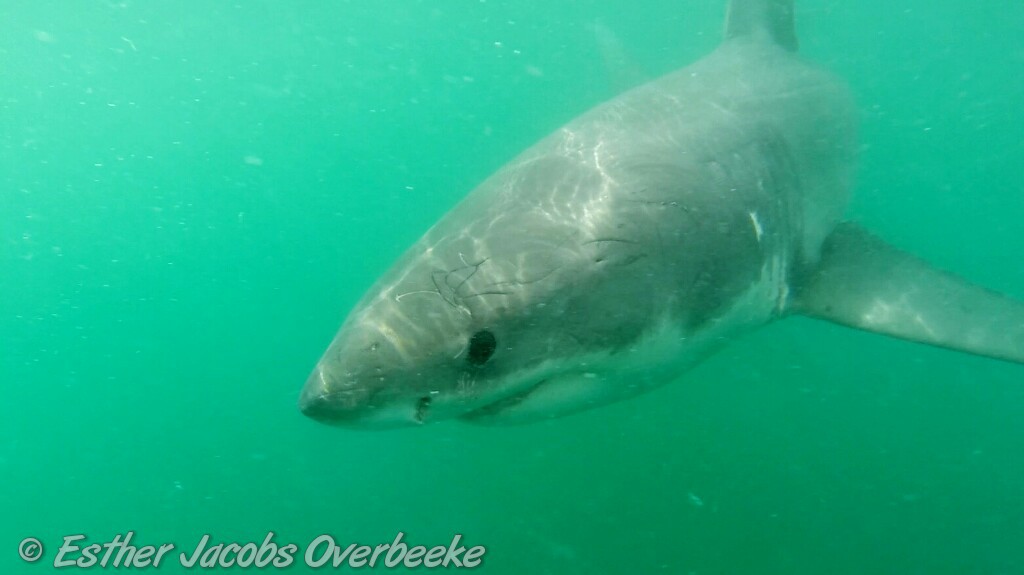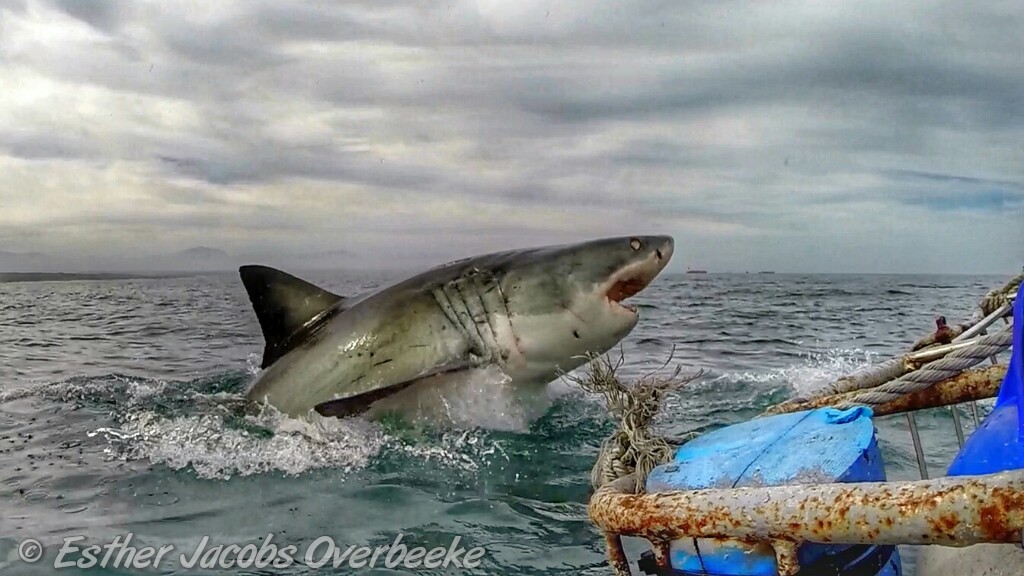Marine Life & Conservation
Sharks… we need them
Sharks have been dealt a poor hand. They are demonised by the media and film industry because that’s what sells papers and movies. It doesn’t help that most species aren’t particularly cute (case and point: the false catshark, Pseudotriakis microdon caught in Scottish waters in October 2015) so we can’t humanise them like we do with dolphins and other charming marine animals. However, sharks are absolutely vital for the health of our oceans, and in turn, the future of our planet.
Overfishing, finning, shark fishing tournaments, bycatch and longlining are all massively reducing our shark populations. Fishing practices like those encouraged by SSACN, pole and line fishing, should be the only methods used. Trawling is very destructive and unselective as the nets haul every life encountered. With longlining, boats spool out hundreds of feet of fishing line with up to 2,000 baited hooks spread along its length. With both these methods, a vast number of marine species, known as ‘bycatch’ are caught and thrown overboard dead or dying, including those listed as vulnerable, threatened or endangered. It was recently reported that thousands of spurdog are discarded into the sea dead annually in the UK. They get caught and crushed in the nets by trawlers pulling up massive catches from the depths. Bycatch amounts to up to 90% of a trawl’s haul and many of these are sharks due to their predatory nature. Global catches have increased by 300%, but much is unreported & unregulated so this figure is likely to be a lot higher. It would be great to see Scotland and the UK set an example with a drastic overhaul of fishing methods and quotas to ensure a sustainable future for UK seas.
Education among the angling community is also crucial and organisations like SSACN are not only valuable resources for information, but are proactive in encouraging best practices for sustainable fishing. With a recent report showing horrifying pictures of 40 dead cat sharks discarded on Chesil beach, by suspected anglers, angling conservation organisations need as much support as they can get to continue their positive messages to change these practices.
The most recent and accurate report states that up to 273 million sharks are killed each year. Sharks just cannot reproduce quickly enough to keep up with the demand and the only way to stop shark extinction is to stop the trades.
To envisage the vital role sharks play in our oceans, think about a fish tank and what needs to happen if one of the fish in that tank contracts a disease. You need to remove that fish from the tank before the disease spreads. Sharks prey on the diseased, the mutated, the injured and the weak, keeping the balance of our ocean’s ecosystem in check.
Sharks are at the top of the ocean food chain and their prey includes species that eat vegetation where the majority of the ocean’s carbon is stored, within seagrass, saltmarsh and mangrove. These blue carbon ecosystems, as they are called, capture and store carbon 40 times faster than rainforests and can store the carbon for thousands of years. Removing sharks from this ecosystem allows these vegetation eaters number’s to increase and results in a release of these ancient carbons and means that less carbon can be stored.
The oceans produce more oxygen than all the rainforests combined, provide a third of the world with food, remove half of the atmosphere’s greenhouse gases, and control our planet’s temperature and weather. Sharks and the oceans desperately need our help.
For individuals, other than ensuring best practice is used when fishing, there are easy ways to help save sharks:
- Never buy make-up or health goods containing shark liver oil, known as squalene
- Never buy products made of shagreen or shark leather
- Never buy fresh shark teeth or jaws
- Always ask what type of fish is being used for your fish and chips as restaurants / takeaways sometimes use shark a.k.a. rock salmon, rock eel, flake, huss or white fish
- Never eat shark fin soup or support a restaurant that sells it
As a Scot living in South Africa working in shark conservation, I have a lot of work to do to change public misconception and fishing practices used here. I recently started a campaign called Keep Fin Alive featuring Fin, a hand-puppet shark on a mission to be photographed with as many people as possible holding a sign that says “I hugged a shark and I liked it… Keep Fin Alive”. He’s already been photographed with well-known actors, singers, chefs, photographers and scientists, including John Hannah, Adam Handling and Jamie Scott. The ultimate goal of the campaign is to take a light-hearted approach to help change the common misconception of sharks and drive more attention to the issues facing sharks.
Esther Jacobs Overbeeke
Shark Conservationist
Founder: Keep Fin Alive
Blogs
Invitation from The Ocean Cleanup for San Francisco port call

6 years ago, The Ocean Cleanup set sail for the Great Pacific Garbage Patch with one goal: to develop the technology to be able to relegate the patch to the history books. On 6 September 2024, The Ocean Cleanup fleet returns to San Francisco bringing with it System 03 to announce the next phase of the cleanup of the Great Pacific Garbage Patch and to offer you a chance to view our cleanup system up-close and personal.
We look forward to seeing you there.
To confirm your presence, please RSVP to press@theoceancleanup.com
PROGRAM
Join The Ocean Cleanup as our two iconic ships and the extraction System 03 return to San Francisco, 6 years and over 100 extractions after we set sail, to create and validate the technology needed to rid the oceans of plastic.
Our founder and CEO, Boyan Slat, will announce the next steps for the cleanup of the Great Pacific Garbage Patch. Giving you a chance to view our cleanup system and the plastic extracted.
Hear important news on what’s next in the mission of The Ocean Cleanup as it seeks to make its mission of ridding the world’s oceans of plastic an achievable and realistic goal.
Interviews and vessel tours are available on request.
PRACTICALITIES
Date: September 6, 2024
Press conference: 12 pm (noon)
Location: The Exploratorium (Google Maps)
Pier 15 (Embarcadero at Green Street), San Francisco, CA
Parking: Visit The Exploratorium’s website for details.
RSVP: press@theoceancleanup.com
Video & photo material from several viewing spots around the bay
We look forward to seeing you there!
ABOUT THE OCEAN CLEANUP
The Ocean Cleanup is an international non-profit that develops and scales technologies to rid the world’s oceans of plastic. They aim to achieve this goal through a dual strategy: intercepting in rivers to stop the flow and cleaning up what has already accumulated in the ocean. For the latter, The Ocean Cleanup develops and deploys large-scale systems to efficiently concentrate the plastic for periodic removal. This plastic is tracked and traced to certify claims of origin when recycling it into new products. To curb the tide via rivers, The Ocean Cleanup has developed Interceptor™ Solutions to halt and extract riverine plastic before it reaches the ocean. As of June 2024, the non-profit has collected over 12 million kilograms (26.4 million pounds) of plastic from aquatic ecosystems around the world. Founded in 2013 by Boyan Slat, The Ocean Cleanup now employs a broadly multi-disciplined team of approximately 140. The foundation is headquartered in Rotterdam, the Netherlands, and opened its first regional office in Kuala Lumpur, Malaysia, in 2023.
Find out more about The Ocean Cleanup at www.theoceancleanup.com.
Marine Life & Conservation
SHARK MONTH ARRIVES AT ROYAL WILLIAM YARD, PLYMOUTH

A shark has been spotted approaching Royal William Yard in Plymouth, much to the surprise of swimmers, paddleboarders and onlookers.
With its distinctive dorsal fin cutting through the water, the sizeable shark swam along the coastline, before turning to head inland towards Firestone Arch at Royal William Yard. The appearance drew a crowd, who were captivated for more than an hour by the unusual sight – and it was all caught on video.
The shark is one of many expected sightings at Royal William Yard over the coming weeks… because today marks the start of Shark Month!
In reality, the ‘shark’ spotted along the Plymouth shoreline was actually a custom-made model, created by the team at Royal William Yard and sailed underwater by Caroline Robertson‑Brown from the Shark Trust, who donned scuba diving gear for the occasion.
The stunt took place to launch Shark Month in style and draw attention to the work of the leading international conservation charity, which is based in Britain’s Ocean City. Spectators were reassured that the water was safe and many entered into the spirit of the performance, swimming or sailing alongside the shark.
Shark Month will take place across Royal William Yard throughout July and will feature an extravaganza of art, entertainment and advocacy for everyone to enjoy. The packed programme of events starts with an art exhibition and ends with a trip on paddleboards with shark experts – with everything from a shark quiz to a Jaws screening in between.
Paul Cox, CEO of the Shark Trust, said: “There are often assumptions and misconceptions when it comes to sharks. This was certainly the case with the shark spotted at Royal William Yard! While the British coastline is home to many species of shark, this was not one of them. However, we’re thrilled it caught people’s attention, because seeing a shark is a special and memorable moment. That is precisely why we want to celebrate these incredible creatures, highlight the need for conservation, and ask for help to safeguard their future.”
For more information about Shark Month at Royal William Yard, visit the Shark Trust Website.
Images and video: Jay Stone
-

 Blogs2 months ago
Blogs2 months agoDiving With… Nico, Ocean Earth Travels, Indonesia
-

 News1 month ago
News1 month agoMurex Bangka Announce New Oceanfront Cottages & Beachfront Dining
-

 Blogs2 months ago
Blogs2 months agoA new idea in freediving from RAID
-

 Marine Life & Conservation1 month ago
Marine Life & Conservation1 month agoIceland issue millionaire whale hunter a licence to murder 128 vulnerable fin whales
-

 Marine Life & Conservation2 months ago
Marine Life & Conservation2 months agoThe Shark Trust Great Shark Snapshot is back
-

 News3 months ago
News3 months agoCharting New Waters; NovoScuba Goes Global with the Launch of their Revolutionary Dive Training Agency!
-

 Gear News1 month ago
Gear News1 month agoNew Suunto Ocean – a dive computer and GPS sports watch in one for adventures below and above the surface
-

 Marine Life & Conservation Blogs2 months ago
Marine Life & Conservation Blogs2 months agoBook Review: Plankton






